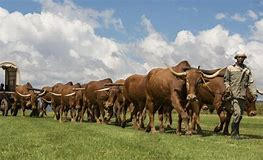






Africa-A Brief History - 3
The Phoenicians expanded their trade and colonized North Africa, They invaded northeast Tunisia and established the city of Utica at the mouth of the Majada River around 1100 B.C. Incidentally, St. Augustine, the black Bishop studied in the African colonial city of Carthage. This city is where the priest/herbalist monastic system of medicine was established and this system expanded herb medicine knowledge all over the European world.The herb and drug knowledge was needed in Europe. European civilization's population was on a massive decline due to dis-eases from their cooked grain (pastry), animal flesh diet, poor hygiene and lack of cleanliness.
Similarly, the introduction of European animals such as domiscated cattle, pigs. and the undomesticated rat caused ecological imbalances in Africa's wild animal population and plant population. Furthermore, the rape of Fertile Crescent (present day Iraq and Iran) for food crops and overgrazing by the flesh eaters animal crops caused damage which still has not been repaired. The massive European dom esticated animal flesh consumption and the methods used to insure the supply of animal flesh has reduced north and northeast Africa to vast wastelands. Alexander the Great invaded Africa and India and left the land treeless and barren.
An uncontrollable need for medicines to save a dying European culture caused the exploitation of plants and the enslavement of black people. It is estimated that the total land lost throughout the course of European history (predominantly in Africa) is greater than the total land now in cultivation in the entire world. (A Vegetarian Sourcebook by Keith Akers.).
Reference: African Holistic Health: Liaila o. Afrika
